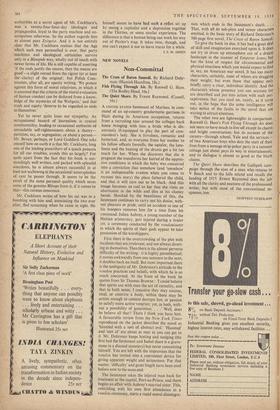NEW NOVELS
Non-Committal
The Cross of Baron Samedi. By Richard Dohr- man. (Hamish Hamilton, 18s.) Fish Flying Through Air. By Roswell G. Ham. (The Bodley Head, 16s.) A UNITED STATES lieutenant of Marines, in com- mand of an up-country gendarmerie garrison in Haiti during its American occupation, returns from a recruiting tour around the colleges back home bringing with him a bride who is dis- astrously ill-equipped to play the part of com- mandant's lady. She is frivolous, romantic and hysterical, and, as everyone from her mother to his fellow officers foretells, the squalor, the lone- liness and the beating of the drums get a bit too much for her. When she discovers that she is pregnant she transforms her hatred of the oppres- sive conditions in which the baby was conceived into a conviction that somehow (and 'somehow' is an indispensable evasion when you come to recount this story) the place fathered the child, and that it will turn out to be black. And this image becomes so real to her that she visits an abortionist in the wilds and dies at his clumsy hands. Shocked by the beastliness of this, the lieutenant continues to carry out his duties, with- out pleasure or pride, until an accident to one of his troopers removes him for a time from his command. Julien Aubrey, a young member of the Haitian aristocracy, gets injured during a bruler zin, a ceremony conducted by the voudouisants in which the spirits of their gods appear to take possession of the worshippers.
First there is the overcrowding of the plot with incidents that are irrelevant, and not always divert- ing in themselves. Then there is the almost perverse difficulty of the writing : it is highly parenthetical; it moves awkwardly from one sentence to the next; it doubles back on itself. But most important there is the ambiguity of Mr. Dohrman's attitude to the voudou practices and beliefs, with which he is so much concerned. At the front of the book he quotes from Sir Thomas Browne : could believe that spirits use with man the act of carnality, and that in both sexes; I conceive they may assume, steal, or contrive a body, within there may be action enough to content decrepit lust, or passion to satisfy more active-veneries; yet, in both, with- out a possibility of generation. . . .' Well, does he believe all that? There I think you have him. A favourable review from the New York Times reproduced on the jacket describes the novel as `haunted with a sort of abstract evil.' Hauntee and 'sort of are about as near as you can get to it. Mr. Dohrman keeps hinting and nudging (the first bed the lieutenant and Isabel share is a grave- stone in a disused cemetery) but never committing himself. You are left with the impression that the voudou has turned into a convenient device for giving apparent weight and seriousness. For that matter, `difficulty' and great length have been used before now to the same end.
The lieutenant takes the injured man back for treatment at the capital, Port-au-Prince, and there begins an affair with Aubrey's married sister. This, coinciding with his own first attendance at a voudou ceremony, starts a rapid moral disintegra- tion which ends in the lieutenant's death.. • • That, with all its sub-plots and minor characters omitted, is the basic story of Richard Dohrman's 500-page first novel, The Cross of Baron Samedi. To give the book its due, it has had a great deal of skill and imagination exercised upon it. It does not try to drum up atmosphere out of a dream landscape in the manner of Emperor Jones, but has the kind of respect for circumstantial and physical exactness which you would expect to find in, say, an American war novel. It has too many characters, certainly, most of whom are dragging their weight; but even those that appear onlY briefly carry a clear, individual identity. And the characters whose presence you can account for are described and put into action with such per- ceptiveness that you read on, vainly, as it turns out, in the hope that the same intelligence will take notice of the faults in the novel that are waving to attract attention.
The other two are lightweights in comparison. Roswell G. Ham's Fish Flying Through Air does not seem to have much to live off except its charm and bright conversation; but its account of the careers—through school, Yale and the services— of two American boys who date the start of their lives from a teenage strip-poker party in a summer cottage just about pays its way in entertainment; and its dialogue is almost as good as the blurb claims.
The Quiet Shore describes the Gallipoli cam- paign through the eyes of a man who returns to V Beach and to the hills inland and recalls the landing of 1915. Ernest Raymond does the job with all the clarity and neatness of the professional writer, but with most of the conventional re- sponses, too.
GEOFFREY NICHOLSON


































 Previous page
Previous page